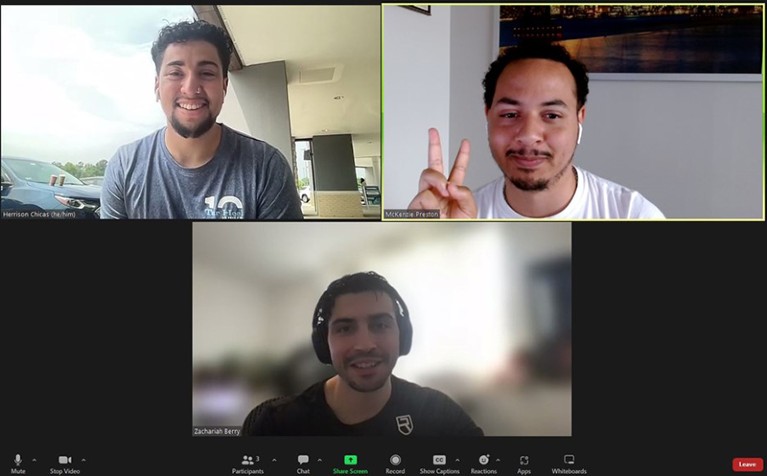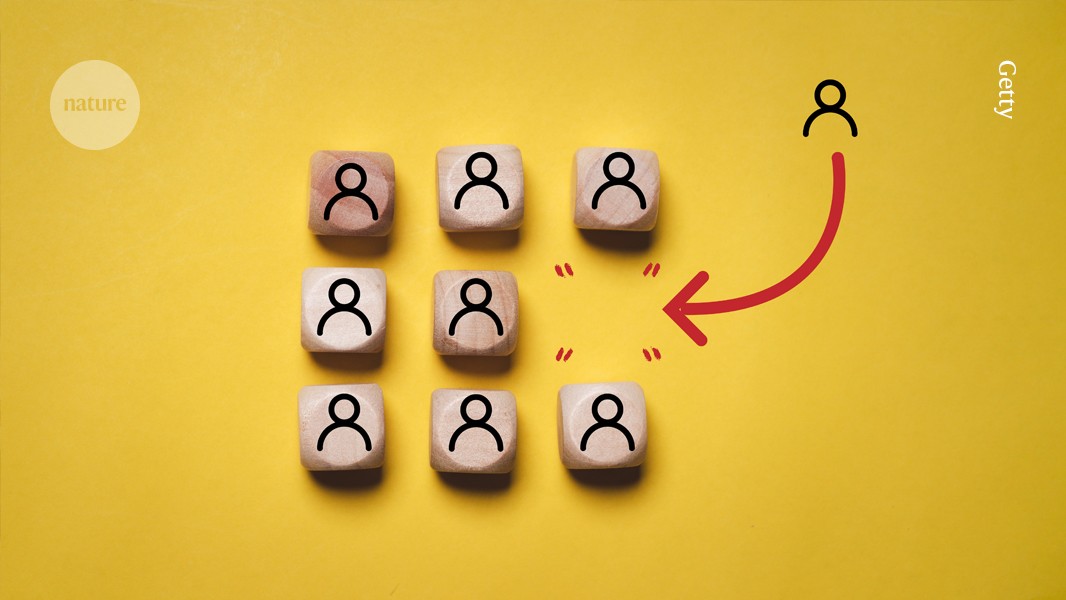
Herrison Chicas (top left), McKenzie Preston (top right) and Zachariah Berry held video calls to share job-market resources.
In the summer of 2023, the three of us entered the academic job market with the same aspirations: to secure a faculty position in the field of organizational behaviour, the study of how individuals and groups interact in organizations.
We were friends, scattered across the United States. M.P. was at the University of Pennsylvania in Philadelphia, Z.B. was at Cornell University in Ithaca, New York, and H.C. was at the University of North Carolina at Chapel Hill. We met in 2018 through the PhD Project, an organization dedicated to supporting doctoral students from historically under-represented groups in business programmes across the United States; M.P. identifies as Black and Z.B. and H.C. identify as Latinx.
Since then, we’ve helped each other through various life events — everything from checking on each other’s mental and physical well-being during the COVID-19 pandemic to providing deeply personal relationship advice. We chatted weekly, seized any opportunity to hang out in person — M.P. and Z.B. would visit a beer garden in Philadelphia whenever Z.B. was in town, for example — and always prioritized time with each other at conferences.
But as we started looking for jobs, we realized we were competing for the same limited number of academic positions. We knew that with every interview or job offer one of us received, the chances for the other two might be diminished. Sharing valuable job-market information, such as insight into the preferences of specific hiring committees, carried the risk of disadvantaging oneself.
Resources for mid-career scientists
This competition weighed heavily on our minds and our friendship, prompting H.C. to set up a phone call for us to address the elephant in the room: how do we approach the market, as friends or foes? During a heartfelt 60-minute conversation, we each shared our perspective, revealing a clear, unified ambition — we wanted to stay friends and help one another navigate the job market.
Ultimately, our collaborative and supportive approach paid off, because we each landed assistant-professor posts: M.P. at New York University, Z.B. at the University of Southern California in Los Angeles and H.C. at the Georgia Institute of Technology in Atlanta. Working towards this as friends took structure, effort and honesty. Here’s what we learnt.
Developing an interdependent mindset
The most pivotal outcome of our discussion was moving from a zero-sum mindset, in which only one of us could succeed, to a collective outlook, which recognized that all three of us could secure a faculty position. This shift was underscored by two key realizations. First, we could not control what a given department might want from a particular hiring cycle, such as preferences based on teaching need or research topic. Second, we each had something unique to offer, such as our research perspectives and personalities.
To maintain this interdependent mindset, we committed to open communication and to displaying vulnerability. Over phone and Zoom calls, we learnt to vent our fears, frustrations, challenges and setbacks. We consciously chose collaboration over competition, and experienced a fulfilling and successful job search. We found that, far from diminishing each other’s opportunities, our individual successes expanded our collective network and knowledge base, benefiting all of us in the long run.
Navigating uncharted waters
Despite years of close friendship, we were entering new territory as individuals and as friends. We recognized that each of us might have different needs, preferences and experiences in the job market that could evolve over time.
Early on, we agreed on some basic interactional norms. In the summer leading up to the job search, we had Zoom check-ins every couple of weeks, during which we shared job-market resources and gave feedback to one another on application materials.
Once the interviews, campus visits and job offers started rolling in, we shifted to individual and group text exchanges. This light-touch approach allowed us to celebrate each other’s successes quickly and easily, and provided a less formal outlet to commiserate with each other over rejections or to debrief on unsuccessful interviews. Scheduled Zoom calls would have been difficult to juggle amid our busy and variable job-search schedules.
Sharing helpful information and resources
Once we embraced an interdependent mindset, transparency and collaboration were crucial. We committed to sharing any useful information that could benefit the group, including new job postings, job application closing dates and personal job-search updates.
This level of open knowledge-sharing proved to be incredibly beneficial. For example, when H.C. was interviewed at a university in New York City before M.P. and Z.B., he shared details about one-to-one interviews with faculty members, the culture of the department and the questions that came up during the job talk. Likewise, when M.P. attended an interview at a university in Houston before H.C., he shared similar insights.
We used a shared drive to exchange sample application materials from others who had experienced the job market in previous years, and circulated our cover letters, research statements and CVs so that we could provide and receive constructive feedback. We also conducted mock interviews and practice job talks with each other, asking challenging research questions and offering constructive feedback. This helped us to refine our presentation content and delivery, while building confidence and resilience for the interviews.
Create and preserve memories
The journey through the academic job market is gruelling, but our friendship was strengthened by it. We made a conscious effort to capture and preserve memories to allow us to reflect on our experiences in the years ahead. For example, we took screenshots during our Zoom calls and stored them in a shared folder, recording a visual timeline of our journeys — from bright-eyed optimistic job-seekers to stressed applicants.
And when campus visits overlapped, we made sure to meet up in person, with H.C. and M.P. getting together in Atlanta and Houston, and Z.B. and M.P. having brunch together in New York City. These encounters offered welcome respite during an intense time.
Now, as proud tenure-track assistant professors, we can look back and appreciate just what an achievement it was for the three of us to successfully navigate the gauntlet of the academic job market together. We are extremely grateful for one another, and the approach we took to the market.



